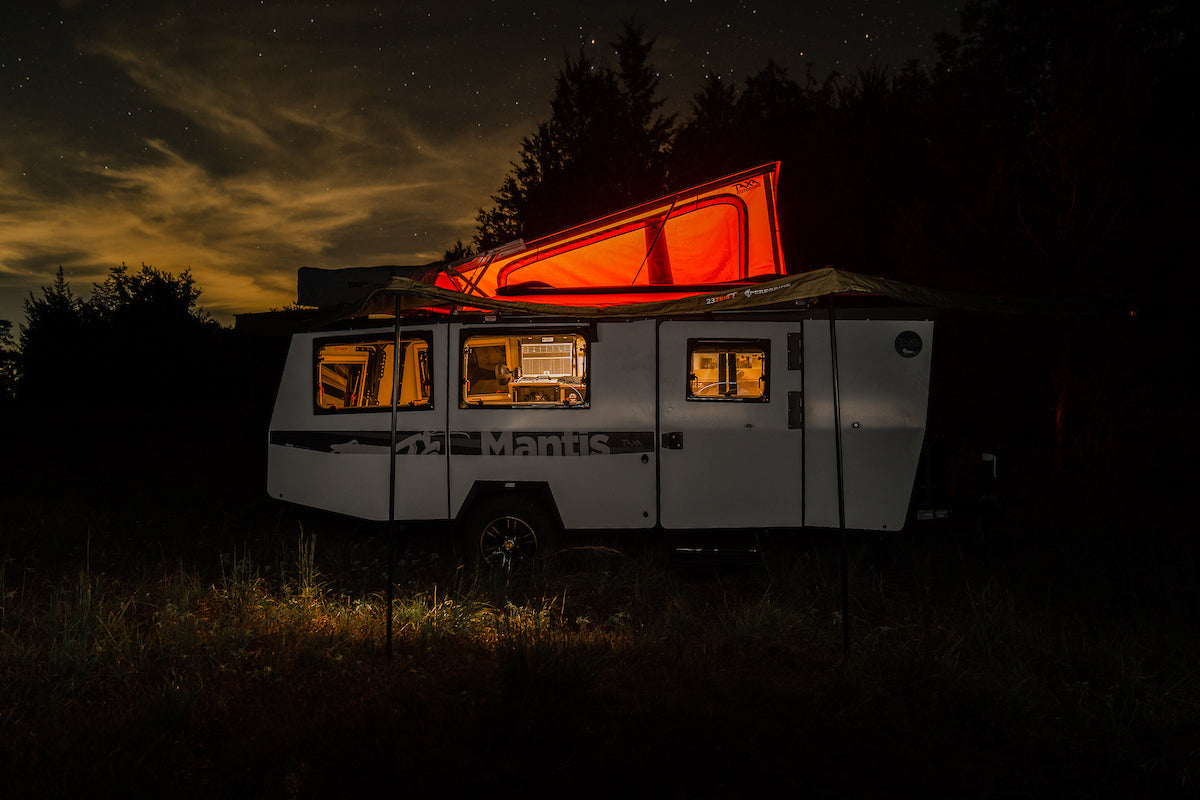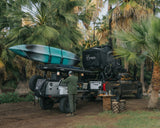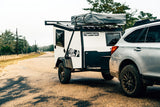Off-road trailer campers are the best way for you to carve out your own temporary space deep in the wild.
Like all travel trailers, they offer a mobile habitat that isn't quite as rigged and cramped as a camper shell, nor as rough and uncomfortable as a tent on the ground. They're an evolutionary step in the world of overlanding that makes off-road adventures far more enjoyable.
There's a lot that separates them from an ordinary travel trailer, though. They need to be designed to thrive in the environment you're stepping into. Careful thought has to go into each design element to ensure it won't fail you deep in the woods.
Moreover, to enjoy the ultimate camping experience on the banks of a lost river or under the stars in a forgotten valley, you need to know what off-road camper trailer features are most important to a successful overlanding adventure.
What Is an Overland Travel Trailer?
An overland trailer camper is a travel trailer meant to be taken off-road. They share much in common with a normal trailer camper but with some unique design elements made for the trail.
- Off-Road Capability: Overland campers feature all-terrain tires, improved suspensions, and higher ground clearances made for the trail. All TAXA traditional Overland campers, including Mantis Overland, come with an axle-less suspension for greater ground clearance. It’s newest lineup, TAXA X Trailers, feature the best off-road builds on the market of any overland trailer, including a Cruisemaster CRS2 Suspension, Cruisemaster DO35 V3 Plus Hitch, and reinforced chassis.
- Self-Sufficiency: Some overland trailers are equipped with solar panels and larger water tanks, while traditional campers rely on campground hookups.
- Compact and Lightweight Design: Overland campers are lighter and more compact for easier towing, whereas traditional campers offer more space but are heavier.
- Minimalist Interior: Interiors are focused on functionality and essentials, while traditional campers emphasize comfort and more elaborate furnishings.
The overland travel trailers combine the right amenities to provide a camping experience that doesn't feel like sleeping in a tin can.

Benefits of an Off-Road Travel Camper
The whole reason to go camping is to be closer to Mother Nature and to interact with beautiful scenery. While traditional campers must be parked at a flat campground, an overland travel trailer allows you to travel directly into the heart of nature.
Instead of hiking miles to scenic destinations, you can pitch your camp right next to one.
Furthermore, your overland camper will provide a much more enjoyable habitat than a tent and sleeping bag in a rucksack–not to mention a far safer one as well.
7 Features to Look for in an Off-Road Camper Trailer
Finding the right overland travel trailer is a big investment. That’s why we’ve listed seven features for you to study.
1. Suspension
An off-road trailer camper's heavy-duty suspension is a crucial factor separating it from a regular trailer camper. Most trailer campers are designed primarily for highway use, with slight bumps at manicured campgrounds being the harshest terrain they'll face.
TAXA Overland campers come with an axle-less suspension that increases ground clearance and enables independent shocks to better handle trails. TAXA’s newest X trailers use a superior Cruisemaster CRS2 Suspension with an axle-less design and improved shock absorbers that can handle more difficult terrain.
2. Craftsmanship
Going off-road means you'll be putting harsh stresses on your trailer. The structure should be designed to handle them, as should the panels, windows, and everything else sitting on it.
Part of protecting your purchase is ensuring that your travel trailer only uses the highest-quality materials and hardware that are up to the task. For example, lots of lower-quality trailers use thin plywood with an aluminum exterior for protection. However, we recommend looking for higher-quality aluminum and fiberglass construction, as well as an all-steel frame ready to handle the stresses of the trail.
3. Braking
It's especially important to be sure that your travel trailer’s brakes work well before going off-roading. Look for a travel trailer with an integrated brake system and electric brake controller that will give you more control on the trail.
4. Hitch
The hitch assembly is the only thing keeping your camper trailer attached to your vehicle. Going off-road will put the integrity of that connection to the test in every way. The hitch, hitch ball, and couplers all need to be reliable enough to prevent the trailer from suddenly separating while you travel.
Look for a hitch with full vertical or horizontal articulation that will allow you to wiggle around trails without the risk of flailing over. TAXA X trailers use a Cruisemaster DO35 V3 Plus Hitch that improves articulation, provides an easy drop-on design, and increases durability.
5. Trailer Dimensions
Whether you're following wagon trails or fire roads or are making your own path through the wilderness, you won't have a lot of room to move. You need a trailer that's small and nimble to allow you to navigate the land more easily. Folding camper trailers offer that small footprint for traveling and will extend to provide more living space when you reach your destination.
6. Exterior Protection
Low-hanging obstacles and brush tear up off-road vehicles without trouble. You want protection from them. Heavy-duty bumpers and fenders will prevent rocks, stumps, and logs from chewing up the lower portion of your trailer. The rugged structure and proper materials used for the frame, siding, and windows are again important to your trailer's resilience off the beaten path.
7. Added Amenities
Off-road trailer campers, while hardy and minimalistic to a degree, don't need to be totally barren of creature comforts. Models with showers, kitchens, and even air conditioning units can truly elevate your off-grid camping experience. It's also worthwhile to pick a model with the aforementioned folding features that allow you to extend or transform the use case of your habitat to make the most of your space.
What Makes TAXA’s Overland Camper So Rugged and Long-Lasting
There are a lot of great off-road trailer campers on the market. What separates TAXA from the pack are the industry-leading minimalist designs, along with the ability to follow through to ensure what works on paper delivers real-world performance.
TAXA's founder, Garrett Finney, is a former NASA architect who worked in the Habitability Design Center. His experiences inspired him to develop rugged trailers that are compact and easy to maneuver and utilize clever features that maximize the living space they can provide. The use of high-quality steel and aluminum, on top of a proper off-road chassis, ensures the trailers are light enough, strong enough, and nimble enough to thrive in this environment.
A good off-road trailer camper is one that's truly built for the environment. A proper suspension, the right wheels and tires, and a rugged structure are paramount to success in this environment.
The trailer that can balance all of that with well-thought packaging and innovative features like you'll find from TAXA will provide the ultimate off-road camping adventure.


